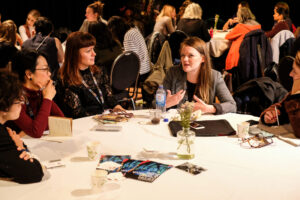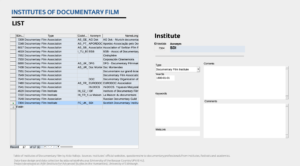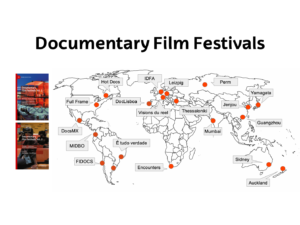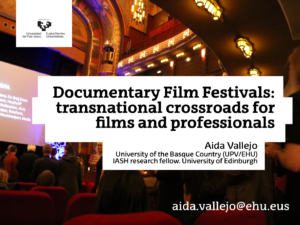IDFmap project / Collaborate / Talks and Presentations / Screenings / Map of Documentary Institutes / Case-study: the SDI /
PRESENTED:
24th May 2022 4pm – 5pm on Teams. Leeds University (UK) (online)
International Research Centre for Interactive Storytelling (IRIS) – Research Seminar
Building Documentary Ecosystems: Institutes, Festivals, Networks
This paper will give an overview of the institutional framework developed around documentary film since the 2000s in the global context. I will look at documentary film festivals and the associations that closely collaborate with them to analyse their role in creating networks of filmmakers, producers, curators, critics as well as audiences. This documentary ecosystem explains the boom of documentary production and exhibition in the last two decades and is key to understand the future developments of documentary cultures around the world.
The paper presents the findins of the IDFmap research project, developed at University of Edinburgh, which relies in Digital Humanities tools to map international documentary institutes and analyse professional networks around them, taking the Scottish Documentary Institute as a case-study.
May 18th, 2022. 17:30–18:30 (CET time). Tübingen University Germany (+online)
Festival Ethnographies: An Anthropological Look at Social Interactions and Cultural Exchange in the Festival Context
Studying Animation Festivals. Networks Spaces Synergies. 5th Workshop – Hybrid Event
A Cooperation of the Research Center for Animation and Emerging Media, University of Tübingen, and the DFG Scientific Network Animation and Contemporary Media Culture.
The talk will focus on the role of the festival as a place for encounter in which different agents interact (filmmakers, audiences, producers, curators, critics, distributors). I will focus on the structural organisation of the event and its implications to promote and breed specific film cultures (looking at examples of the short documentary and animation circuit).
May 4th, 2022. 13:00 (UK time)
An IASH Work-in-Progress seminar, delivered by Dr Aida Vallejo (Nominated Fellow 2021-22; University of the Basque Country UPV/EHU):
“Mapping Documentary Film Institutes and Networks: A Digital Humanities Approach to Collaborative Practices in the Creative Industries”.
This presentation will look at the possibilities opened up by Digital Humanities for the analysis of global cultural practices and infrastructures. It will show the results of the IDFmap project, which includes the creation of a global map of institutes for the promotion of documentary film operating worldwide, and a thorough analysis of the Scottish Documentary Institute, as a key agent for the promotion of documentary in Scotland since 2004. The study focuses on collaborative practices and connections, to unfold the cultural power relationships and hierarchies that underlie them, and that reflect post-colonial logics of cultural influence and dependence.
Firstly, I will reflect on methodological problems for the study of cultural industries in the digital context, and how Digital Humanities tools can help to overcome them. I will look at the practical implications of collecting and storing social and cultural data, establishing relationships among them by building databases, visualising their geopolitical scope by drawing digital maps, and analysing their relationships by creating network graphs. Secondly, I will analyse how these tools can serve to better understand international as well as local dynamics of cultural exchange, influence and power developed in the specific context of documentary film production and distribution in the last two decades.
–> (in person and online, Institute for Advanced Research in the Humanities, University of Edinburgh).
Recording of the session available here (with transcription).
April 28th, 2022.
Edinburgh Film Seminars. School of Literatures, Languages and Cultures. Film and Intermediality.
–> Online. Free registration here.
Guest – Dr Aida Vallejo (University of Edinburgh/University of the Basque Country)
Host – Dr Pasquale Iannone (University of Edinburgh)
Title – The Documentary Festival Ecosystem
Series – Edinburgh Film Seminars
“The Documentary Festival Ecosystem”
Since the 2000s, a network of cultural infrastructures devoted to documentary film production and dissemination has developed globally, providing a breeding ground for creative documentary films aimed at the big screen. This network includes a growing number of specialised film festivals as well as institutes for the development of documentary film which closely collaborate with them.
This seminar will focus on the international ecosystem of documentary film festivals, reflecting on their different profiles and cultural dynamics, as well as the institutional networks developed around them.
It will look at programming policies and identity politics developed at the festival site, giving particular attention to the social aspects that shape their operational logics.
By looking at the structural changes brought about by digitisation and new exhibition possibilities opened up by streaming, it will open up new questions about the future of documentary viewing in a moment of redefinition of the physical and virtual experiences.
Friday, April 22th, 2022.
BAFTSS conference, University of St Andrews.
2.30 – 4.15 Session I: 3. Documentary Collaboration and Creativity
Chair: Philippa Lovatt (University of St Andrews)
- Aida Vallejo (University of Edinburgh & University of the Basque Country):
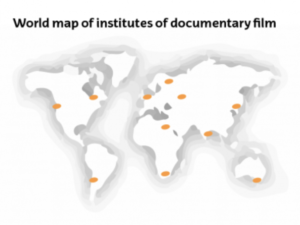
“Institutes of the documentary film: networking and collaborative practices in the creative industries”
Since the 2000s a network of cultural infrastructures devoted to documentary film production and dissemination has developed globally, providing a breeding ground for creative documentary films aimed at the big screen. This network includes a growing number of specialised film festivals (see Vallejo and Winton 2020), as well as institutes for the development of documentary film which closely collaborate with them. By focusing on the origin and operational logics of these institutes we will analyse how they became nodal points for the development of professional careers, as well as key intermediaries between industry and creativity in the last two decades.
This paper is part of a larger study that analyses the impact of these institutes in contemporary documentary cultures, taking the Scottish Documentary Institute (SDI) as a case study. It presents some of the findings of the IDFmap research project, developed at the IASH of the University of Edinburgh, which relies on Digital Humanities and Spatial Humanities tools for data collection, social network analysis and visualisation of research outputs and datasets (Boenhamer et al. 2010).
We will analyse 3 different types of collaborative practice developed at the Scottish Documentary Institute: (1) institutional connections (between the institute and other organisations, including festivals), (2) social networks (among professionals participating in SDI activities), and (3) film circulation (of films produced and promoted by the institute). By looking at the evolution of these collaborative practices in the last two decades, we will evaluate the SDI impact in fostering local documentary film communities and the global circulation of their works.
- Alexandra Colta (University of Glasgow): Film Festivals: Between activitism and cinephilia
- Andrew Moore (University of Edinburgh): The fruits of the in-between: Creativity, Cross-polination and institutional critique in the Sensory Ethnography Lab’s Expedition Content (2020)
Friday, 25 February 2022 @ 12pm ET/5pm GMT
SCMS/ BAFTSS Transnational Cinema – Reading group meeting.
Guest Speaker: Dr Aida Vallejo.
Title: Documentary Film Festivals: transnational crossroads for films and professionals
This presentation will look at the international documentary film festival ecosystem, focusing on transnational power dynamics that operate within it. It will reflect on the role of specialised festival circuit as nodal points for the recognition and consolidation of filmmakers and films and the promotion of cultural diversity. Particular attention will be given to geo-political areas of influence, and cultural power relationships articulated at the festival site.
Aida Vallejo is associate professor at the University of the Basque Country (Spain) and researcher specialised on documentary film, film festivals and creative industries. She has co-edited the books Documentary Film Festivals Vol.1 and Vol.2 and Film Festivals and Anthropology. Currently she is research fellow at the Institute for Advanced Studies in the Humanities at the University of Edinburgh, where she develops a Digital Humanities research project about institutes of documentary film.
Reading:
- Vallejo, Aida (2020) “Introduction part I, Vol. 2: Changes and Challenges for Documentary and Film Festivals”. In Documentary Film Festivals Vol 2: Changes, Challenges, Professional Perspectives. Palgrave MacMillan: Cham, Switzerland (Framing Film Festivals Series), 13-21. https://doi.org/10.1007/978-3-030-17324-1₂
- Vallejo, Aida (2020) “IDFA’s Industry Model: Fostering Global Documentary Production and Distribution”. In Documentary Film Festivals Vol 2: Changes, Challenges, Professional Perspectives. Palgrave MacMillan: Cham, Switzerland (Framing Film Festivals Series), 23-53.https://doi.org/10.1007/978-3-030-17324-1_3
